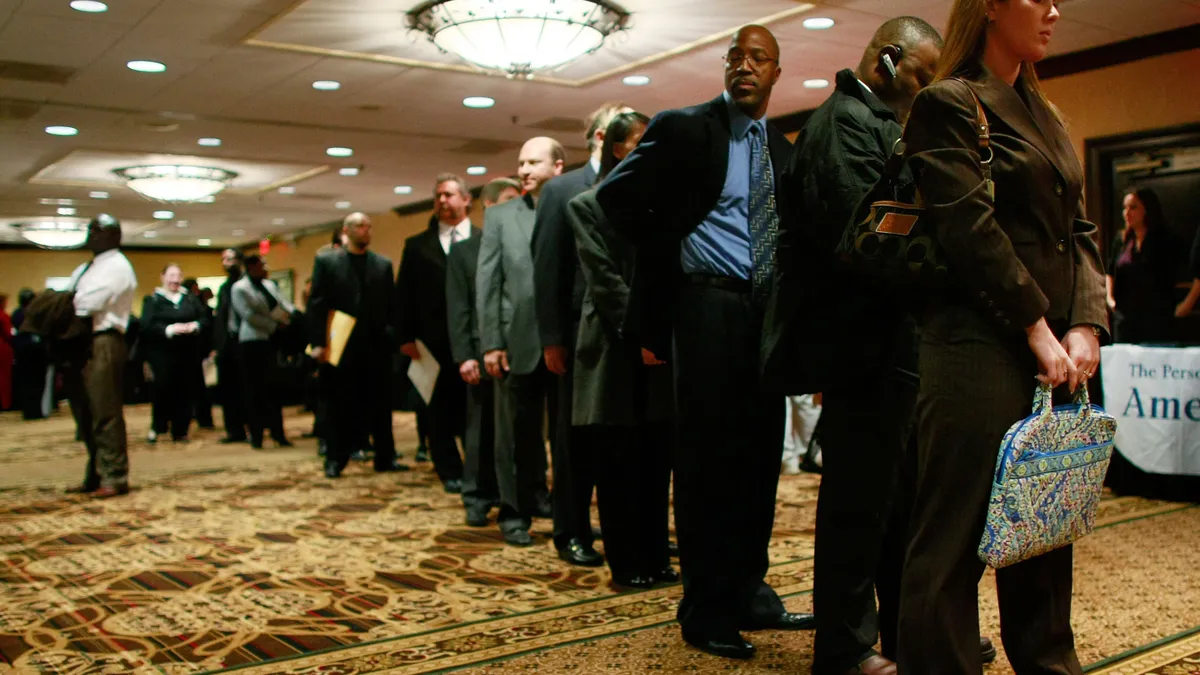Whether one calls it the "great resignation," "the great reckoning" or some other newfangled term, the current state of the talent market is creating a sense of urgency for HR teams.
The storm has been brewing for some time; in June, a Robert Half report revealed that nearly one-third of workers surveyed said they soon planned to look for a new role, with more than half of Generation Z respondents indicating they planned to leave their current jobs. For nearly 1 in 3 workers in the survey, the pandemic led to a "shift in perspective" that caused them to seek work at an organization better aligned with their values.
So far, suggestions about how to deal with that shift are varied. Focus on retention is key, through aspects such as benefits, flexibility and compensation, among others. To give readers food for thought, we asked a group of CHROs to talk about how their organizations have approached the great resignation and its impact.
Don't chase 'shiny objects'
In times of dramatic change, employers may be tempted to throw everything at the wall, said Annie Lin, VP of people at recruiting software firm Lever.
Take compensation, for example. If an employer notices a trend of employees leaving due to their pay, it may make sense to build in pay increases or make other adjustments to compensation strategy, she said. But that does not mean that every trend or benefit will necessarily make sense for an organization's culture.
"There's a lot of shiny objects out there," Lin said. "It can be really easy for companies to panic and try to do everything to attract talent, but the situation is not necessarily a sea change from what came before."
The talent market has been "very, very crowded for a very long time," she continued, and employers would be better served by identifying and doubling down on the small number of things that make their organizations unique and good places to work.
At Lever, Lin said any team member who might be involved in interviewing candidates can speak to what makes the company's employer brand special. That has meant focusing on causes that are important to Lever, such as ensuring fair and equitable pay for all employees, but it also includes talking about the value the company places on treating co-workers with kindness. "It's something we emphasize a lot, and it helps attract people who like that kind of environment," Lin added.
It also has been important for Lever's recruiters to be on the same page when it comes to elements like compensation and the type of work environment that the company presents to candidates, she noted. Candidates, Lin said, appreciate this kind of alignment; "it makes it more likely that they'll accept your offer."
To that end, Lever does not shy away from talking about aspects such as the compensation of those in leadership roles. Leaders have an outsized impact on the culture of a business, so the details such as compensation can reveal a lot about how equitable and internally mobile an organization actually is, Lin said.
Put your people at the center
Employers need to navigate the current moment by putting their people at the center of their operations, according to Patrick McLaughlin, senior VP of HR and CHRO at Frito-Lay North America.
"Frito-Lay is a people-focused company – we listen to our associates and our frontline associates are the heart of our business," McLaughlin said in an email. "As a company, we know that we only achieve success if we always put our people first above all else."
The company has done this in part by building a benefits package for its hourly workers that supports well-being and development, including scholarships and education assistance for employees and their children. Additional investments in compensation mean supply chain hires at Frito-Lay may earn between $22.48 and $43.32 per hour.
"We've been present in the market for over 85 years and during these years our business (like many others) has remained committed despite external headwinds and challenges," McLaughlin said.
But it also has dealt with its share of controversy. Frito-Lay signed an agreement with workers at a Topeka, Kansas, plant who held a 20-day strike in which they alleged the company forced them to work 12-hour days, seven days a week, according to outlet Labor Notes.
"We believe our approach to resolving this strike demonstrates how we listen to our employees, and when concerns are raised, they are taken seriously and addressed," Frito-Lay said in a July 24 statement. "Looking ahead, we look forward to continuing to build on what we have accomplished together based on mutual trust and respect."
Emphasize purpose in work
The past year has been a time of "extraordinary change" in terms of how and where people are working, said Linda Shaffer, chief people and place operations officer at background check software firm Checkr. Operating in an already competitive technology industry, Shaffer noted that it has been important for Checkr to place a premium on purpose.
"All of these things mean that employees and workers are really looking for something meaningful to hold onto," she said. "How do you help people find purpose and meaning?"
One of Checkr's core focuses is to build fairness into the hiring process, Shaffer continued. In one of the company's employee resource groups, Bounce Back to Work, employees volunteer to help formerly incarcerated persons and those challenged by criminal records find employment.
"I think as a company we've enabled and supported those ideas and activities, giving them room and creativity and financial support to go a long way," Schaffer said.
Managers are essential in bringing meaning into work because of the connection they build with the individuals across their teams, she noted. Connectivity also is key, and even simple actions like one-on-one conversations with team members can build camaraderie.
Additionally, Checkr seeks to allow employees to focus on their passions. Even before the pandemic, the company offered a sabbatical program to give employees a chance to take time off, recharge, travel or take up a new hobby. Schaffer said the program allows employees to come back to work energized, and it has proven popular with long-tenured employees.





















